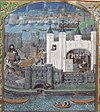|
|
|
|
|
Other areas of Wikipedia
- Community portal – Bulletin board, projects, resources and activities covering a wide range of Wikipedia areas.
- Help desk – Ask questions about using Wikipedia.
- Local embassy – For Wikipedia-related communication in languages other than English.
- Reference desk – Serving as virtual librarians, Wikipedia volunteers tackle your questions on a wide range of subjects.
- Site news – Announcements, updates, articles and press releases on Wikipedia and the Wikimedia Foundation.
- Village pump – For discussions about Wikipedia itself, including areas for technical issues and policies.
Wikipedia's sister projects
Wikipedia is hosted by the Wikimedia Foundation, a non-profit organization that also hosts a range of other projects:
| |
Commons Free media repository |
|
MediaWiki Wiki software development |
|
Meta-Wiki Wikimedia project coordination |
| |
Wikibooks Free textbooks and manuals |
|
Wikidata Free knowledge base |
|
Wikinews Free-content news |
| |
Wikiquote Collection of quotations |
|
Wikisource Free-content library |
|
Wikispecies Directory of species |
| |
Wikiversity Free learning materials and activities |
|
Wikivoyage Free travel guide |
|
Wiktionary Dictionary and thesaurus |





